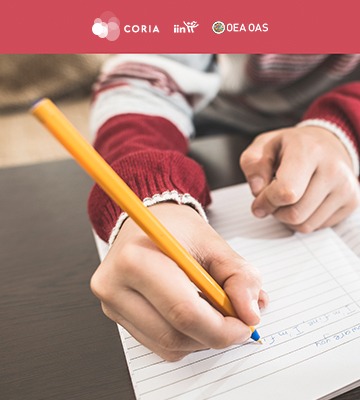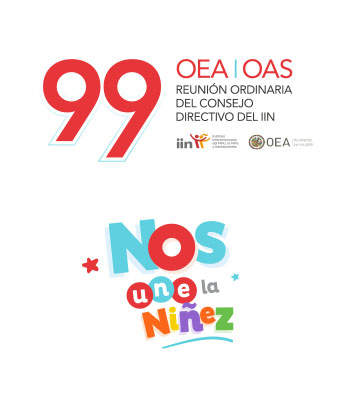COVID 19, childhood and adult responsibilities
Let’s take over fear… let’s avoid panic
COVID 19, childhood and adult responsibilities
The capacity and speed of transmission of the virus known as COVID 19 led the World Health Organization (WHO) to define the situation generated worldwide as a pandemic. This implies that all countries have to take extreme public health measures and adapt services to respond to the arrival of the virus. These measures include a set of provisions that bring about radical alteration of our routines, affect the rhythms of life and with them our relations. This new reality that is imposed on us abruptly and for an indefinite period triggers diverse feelings and behaviors, which in many cases can be negative for our health understood in a comprehensive sense.
We are facing a disaster situation that psychologists define as “abrupt rupture of our daily life”. This rupture involves fears that can be considered as an adaptive response to a situation that deserves to increase our capacities for self-protection and alert us to real dangers. However, these fears of the real are nourished by fantasies and feed on other fears, which favors the panic reaction. Fear creates awareness of danger, panic paralyzes, traumatizes and makes you sick.
The threat of disease is associated and potentiated with the universal fears that all human beings have: fear of loneliness, from isolation, fear of hunger and misery due to shortages but also to the economic and social crisis triggered by this situation, and fear of death both our own and our loved ones.
This situation of vulnerability in which we are all immersed, requires the responsible management of a set of behaviors that tend to avoid contagion, as has been spread by different organizations led by the WHO, but tools and resources are also needed to cope in the best way, new, unforeseen and uncertain situations regarding their magnitude and duration.
One of the characteristics of disaster situations is that the usual reactions to similar situations cannot be put into practice in this new context. In a new situation the immediate reflection is to meet, to share information and make decisions, if someone is sick we tend to visit, if there is a death we go to accompany and hug the sufferers, if our children are bored we invite friends to play or we propose to go out to some recreational activity with other children. We can do nothing of that. We must think of new ways to respond to these and other everyday situations.
The massive quarantine deprives us from our ties, from our ability to circulate through different spaces during the day; and at the same time it imposes more intense and permanent relationships on the interior of our homes. Simultaneously we are invaded by an excess of information, often contradictory in which alarmist messages coexist with those that deny the gravity of the situation. Between them there is a small space for objectivity and the rationalization of information. When there are gaps in the information, contradictory messages, or the sources are unreliable, rumors are potentiated and with them panic.
The accumulated experience shows us that the immediate as well as the medium and long-term damages that can be faced by children and adolescents when facing a potentially traumatic situation such as this, depend on factors such as the moment of their development, personal history and the context, but fundamentally it is related to the attitude and the way in which the referring adults respond to the situation.
Now, as always, protecting and guaranteeing the rights of children is a co-responsibility between family, community and State. No one is out of these responsibilities, each in its place and with their specific roles.
How to protect children and adolescents in this new reality?
As adults what can or should we do?
How to promote self-care and solidarity behaviors?
The first thing is to reaffirm is the conviction that children and adolescents retain all their rights. There is no suspension of children’s rights for being in a critical situation. The question is how they are exercised and reinterpreted under these conditions.
Let’s start with the right to information. Children and adolescents should receive clear, concise information, according to the levels of development but without minimizing their comprehension abilities. Adults must recognize fear and concern. If we deny or hide it, the child will capture our state of mind and their fantasies about what we hide will always be much more terrible than reality. In addition, we would be implicitly transmitting that we do not want to talk about it, which closes the possibility of dialogue and leaves the child alone.
We can never lie or disguise the truth. When boys and girls perceive that an adult is lying, they lose confidence and feel disappointed and unprotected.
It is important not only to inform but to listen, to leave space for the child to react and express themselves. In other words, enable intergenerational dialogue.
We must be careful not to transmit excessive anxiety or anger. The forced isolation that quarantines and full-time coexistence entail, puts us at a very high risk of extreme situations of violence to which children are especially exposed. When we perceive situations of anger or conflict we must know how to stop our reactions in time.
We cannot and should not go outside our houses, but we can choose how to be in them. We must build a new routine that respects the place of each member of the family with moments of privacy and encounter. It is important to organize a daily routine. Respect common schedules, delimit the time of the tasks, both work for adults and school for the little ones.
We cannot visit or meet friends, but technology offers us the possibility to share and converse with them without risk. Children and adolescents are very skilled in handling these tools. We must learn with them. Children and adolescents taking into account their progressive autonomy are part of the solution to this problem. Be creative in respecting the rights of children (and adults) to play and recreation.
Within the limits of the possible, it is important to listen to the proposals of children regarding what to do with their free time: it is an opportunity to generate enjoyable encounters that do not interfere with the activities that each one carries out.
It is much and very important in these conditions what we adults can do inside our houses. No less important is the implementation of solidarity mechanisms at the community level that ensure supplies to those who have difficulties obtaining them, collaborate with compliance with the measures imposed by the health authorities and transmit in concrete actions the concern of everyone. But in a region characterized by inequality, with a high number of people who carry out work activities in informality, with very little ability to save in the face of the paralysis of the economy and its differential effects according to levels of social vulnerability, the role of States is essential in guaranteeing the minimum necessary for a decent life.
We are facing a new situation for all, to which we do not have all the answers. Information, the capacity for reflection, the power to think about what happens to us and to others, is an essentially human capacity, of everyone, regardless of age or condition; And it is the main tool we have to face adverse situations like the one that challenges us today.
Without trying to list solutions, we will end by pointing out some attitudes that strengthen our ability to face this challenge.
- Review our usual forms of communication. Physical isolation does not imply disconnection with other people or groups.
- Try to be more empathetic. Put ourselves in the other’s place.
- Promote spaces for intergenerational dialogue within our homes.
- Make a safe use of the internet and other technological tools available at home.
- Protecting the right of children and adolescents to health does not imply violating or delaying other rights (education, information, recreation, participation, among others).
- We promote dialogue and agreed ways of organizing our daily lives and conflict resolution.
- Let’s share our experiences with friends, neighbors, family members using the opportunities that new technologies give us.
- Let’s not forget that although we cannot and should not leave our homes, we can choose how to be in them.
Choose how to go through this emergency … Promote and protect everyone’s rights!
Víctor Giorgi
Director


